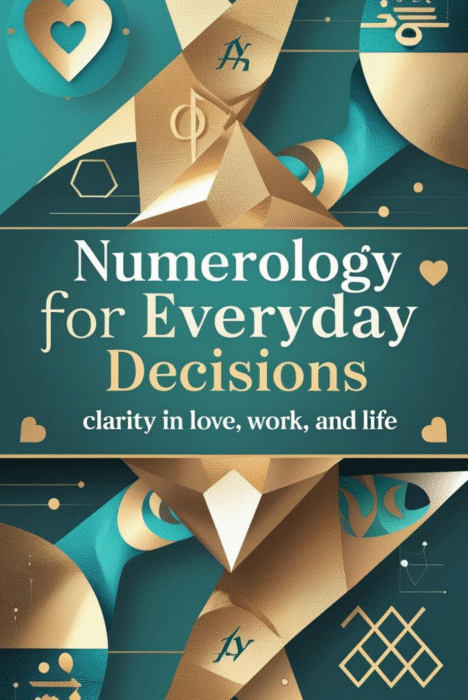Your early years are full of lessons that shape the rest of your life. Numerology reveals that your life unfolds in three cycles of nine years each, with the First Life Cycle laying the foundation for your personal growth, relationships, and career. By understanding your First Life Cycle number, you can recognize the patterns that have influenced your choices and develop clarity on your purpose.
In this blog, you’ll learn how to calculate your First Life Cycle using only your birthday and birth month, and understand the types of experiences and challenges each number represents in early life.
How to Calculate Your First Life Cycle
-
Take your day of birth and month of birth.
-
Example: October 16 → 16 + 10 = 26 → 2 + 6 = 8
-
-
Reduce the sum to a single digit (unless it’s a master number like 11, 22, or 33).
-
The resulting number is your First Life Cycle number.
-
This cycle usually spans from birth to around 27–30 years, preparing you for your second and third life cycles.
The Meaning of Each First Life Cycle Number and Early Life Experiences
1 – Independence and Leadership
-
Experiences: Often, children with a First Cycle 1 may have grown up needing to assert themselves, stand out, or take responsibility early. They might have experienced situations where they had to develop independence because of absent guidance or encouragement.
-
Lesson: Cultivating self-confidence, leadership, and personal initiative.
2 – Cooperation and Relationships
-
Experiences: First Cycle 2 often involves learning patience and emotional sensitivity. These individuals may have had to navigate conflicts at home or in friendships, or act as peacemakers. Family dynamics might include a need to mediate between siblings or parents.
-
Lesson: Developing empathy, teamwork, and harmony in relationships.
3 – Creativity and Expression
-
Experiences: Children with a First Cycle 3 often grow up in environments where communication and self-expression are key. They may have sought approval from family members or faced challenges expressing their emotions. Some may have felt overlooked, motivating them to find creative outlets.
-
Lesson: Learning to communicate effectively, embrace creativity, and enjoy self-expression.
4 – Discipline and Foundations
-
Experiences: First Cycle 4 often indicates an upbringing focused on structure, rules, or responsibility. Children might have had strict parents or faced early responsibilities at home. Stability and routine are emphasized, sometimes leading to feelings of restriction.
-
Lesson: Developing discipline, reliability, and strong personal foundations.
5 – Freedom and Adaptability
-
Experiences: Those with a First Cycle 5 may have experienced a highly dynamic environment—frequent changes, travel, or instability. Parents might have been unpredictable or overly permissive. These experiences push the individual to learn adaptability and flexibility.
-
Lesson: Embracing change, independence, and the ability to take risks.
6 – Responsibility and Nurturing
-
Experiences: Children with a First Cycle 6 may have grown up in homes with strong family expectations. They might have had to care for siblings, manage family duties, or balance personal desires with responsibilities. A parental figure could have been nurturing or demanding in matters of duty.
-
Lesson: Cultivating responsibility, compassion, and commitment to others.
7 – Introspection and Spiritual Growth
-
Experiences: First Cycle 7 often involves a demanding or controlling maternal influence. Children may have felt isolated, misunderstood, or pressured to achieve perfection. This encourages introspection, analytical thinking, and spiritual seeking.
-
Lesson: Developing self-reflection, inner wisdom, and a deep understanding of life’s mysteries.
8 – Power and Independence
-
Experiences: First Cycle 8 can involve challenges with authority, particularly paternal figures. Children might have experienced abandonment, overly authoritarian parents, or overindulgence. These situations push the individual to learn self-reliance, discipline, and mastery over material or personal power.
-
Lesson: Cultivating independence, resilience, and personal empowerment.
9 – Completion and Letting Go
-
Experiences: Those with a First Cycle 9 may have experienced early lessons in empathy, loss, or endings. Family or societal circumstances may have encouraged responsibility beyond their years. These experiences foster humanitarian awareness and emotional maturity.
-
Lesson: Learning compassion, letting go, and preparing for transformation.
Why Your First Life Cycle Matters
Understanding your First Life Cycle allows you to:
-
Identify patterns and recurring themes in your early life.
-
Gain insight into challenges that shaped your personality.
-
Align your decisions with your true purpose in later cycles.
-
Recognize strengths and weaknesses formed during foundational years.
By examining your early experiences through your First Cycle, you can make conscious choices in relationships, career, and personal growth, ensuring you don’t repeat limiting patterns.
Practical Tips to Use Your First Life Cycle
-
Reflect on your childhood experiences and family dynamics.
-
Journal lessons learned during early life challenges.
-
Meditate on your number to connect with its energy and guidance.
-
Apply the insights to current life decisions, such as relationships or career moves.
-
Prepare for the second and third cycles, using your early-life lessons as guidance.
Conclusion: Your First Cycle as Your Life Compass
Your First Life Cycle is a roadmap of your early years, highlighting the lessons, experiences, and patterns that shape who you are. By understanding the energy of your number and the circumstances it reflects—whether it’s dealing with authority, learning independence, or developing emotional intelligence—you gain a clearer perspective on your life’s path.
Numerology shows that every challenge and experience in your early years is purposeful, preparing you for the next stages of your journey. Recognizing these lessons empowers you to step into your life with awareness, intentionality, and the ability to align with your true purpose.

